Hormonal Imbalance Cure
Hormonal Imbalances can trigger our body and mind causing it to be disrupted in so many ways. It is essential for us to keep track of our diet and lifestyle. So stay in touch because this will give you a stretch on Hormonal Imbalance Cure
I am less exhausted after my wellness sessions
“In the middle of the night, I noticed all my pains were completely gone. No shoulder hurting, no hip or lower back hurting, no knee pain at all, and when I got up, it was all true. Thank you thank you! A thousand thank you’s! I am still a spring chicken!”
“The aching, sore sensation in my back and kidneys completely lifted. I feel less exhausted all the time and more connected to myself, more calm, whole and stable, and after the clearing, I felt lighter, as if there no gravity beneath me, or like I was made of helium.”
The Overweight are prone to Hormonal Imbalance
Polycystic Ovary Syndrome (PCOS) is a common syndrome of hormonal imbalance in which there is excessive production of male hormone testosterone by the female ovary, it’s a condition affecting teenage girls and women nowadays.
“It is also observed more in obese females. Thus it looks like a combination of nature and nurture are the major contributor of this syndrome” – Dr.Bashar Neamat Fadheel Sahar (Specialist Internal Medicine Endocrinology)

Two factors of this Syndrome are women having an irregular cycle with delayed or missed periods and excessive hair growth on the face and body. Other important symptoms include acne, weight change, patches of dark skin on the nape of the neck, axillae, cubital fossa.
(Source: Khaleej Times, September 28, 2013)
What are Hormones?
Hormones are your body’s chemical messengers. They travel in your bloodstream to tissues and organs. They work slowly, over time, and affect many different processes, including metabolism, sexual function, reproduction, mood and much more.
Additionally, hormones are produced in a complex process but depend on beneficial fats and cholesterol, so lack of these important dietary factors can cause hormone problems simply because the body doesn’t have the building blocks to make them.
Toxins containing chemicals that mimic these building blocks or the hormones themselves are also problematic because the body can attempt to create hormones using the wrong building blocks.
Glands that produce our hormones
Thyroid – is a butterfly-shaped gland at the base of the neck. It produces the hormones T3, T4, and calcitonin, which are responsible for maintaining the body’s metabolism, sleep, heart rate, growth, brain development etc.. If the thyroid doesn’t produce enough of these hormones, a condition called hypothyroidism, the result is often weight gain.
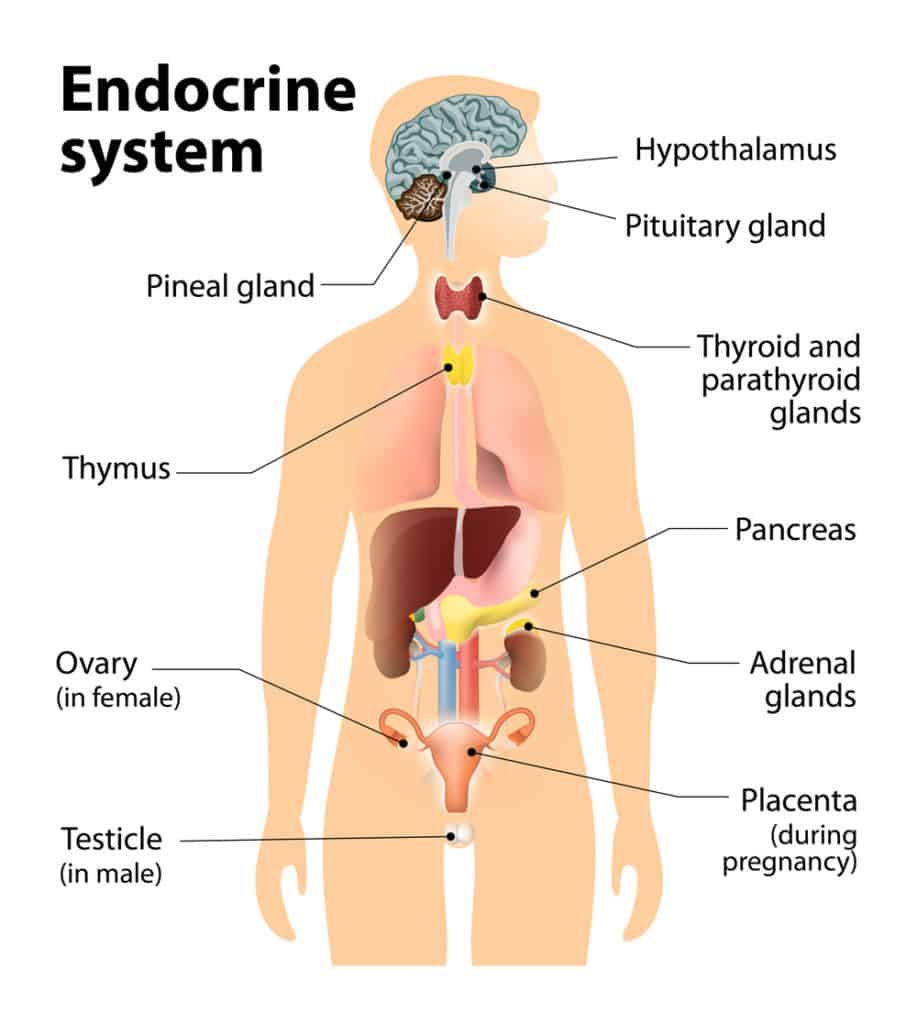
Pineal gland- is situated in the middle of the human brain and is the major site of the body’s melatonin production.
Pancreas- is an organ located in the abdomen. The pancreas has two main functions: an exocrine function that helps in digestion and an endocrine function that regulates blood sugar.
Pituitary- sits on the under the portion of the brain. It is often referred to as the master gland and makes a variety of hormones that are important in controlling hormonal systems throughout the body. Further to that, pituitary gland controls the thyroid gland, adrenocorticotropic gland, the reproductive system, and produces growth hormones as well as prolactin.
Adrenal gland- are small structures attached to the top of each kidney. The human body has two adrenal glands that release chemicals called hormones into the bloodstream. These hormones affect many parts of the human body.
Hypothalamus- It is an amazing gland in the brain that is half endocrine (hormonal-gland) and nervous system (autonomic nervous system) structure that helps you maintain homeostasis. This gland works with the pituitary to get things done.
Parathyroid- this gland produces the parathyroid hormone (PTH). This hormone controls calcium, by increasing it. It will rob the bone of calcium to keep normal levels of calcium in the blood. Then, it will also convert the inactive vitamin D3 to active vitamin D3.
Ovaries- a female reproductive organ, often paired, that produces ova and in mammals secretes the hormones estrogen and progesterone.
Testes- commonly known as the testicles, are a pair of ovoid glandular organs that are central to the function of the male reproductive system. The testes are responsible for the production of sperm cells and the male sex hormone testosterone.
Thymus gland- is the main organ of the lymphatic system. Located in the upper chest region, the primary function of this gland is to promote the development of specific cells of the immune system called T lymphocytes.
T lymphocytes or T-cells are white blood cells that protect against foreign organisms (bacteria and viruses) that have managed to infect body cells. In addition, they protect the body from itself by controlling cancerous cells. From infancy to adolescence, the thymus is relatively large in size. After puberty, the thymus begins to decrease in size and continues to shrink with age.
Functions of Hormones
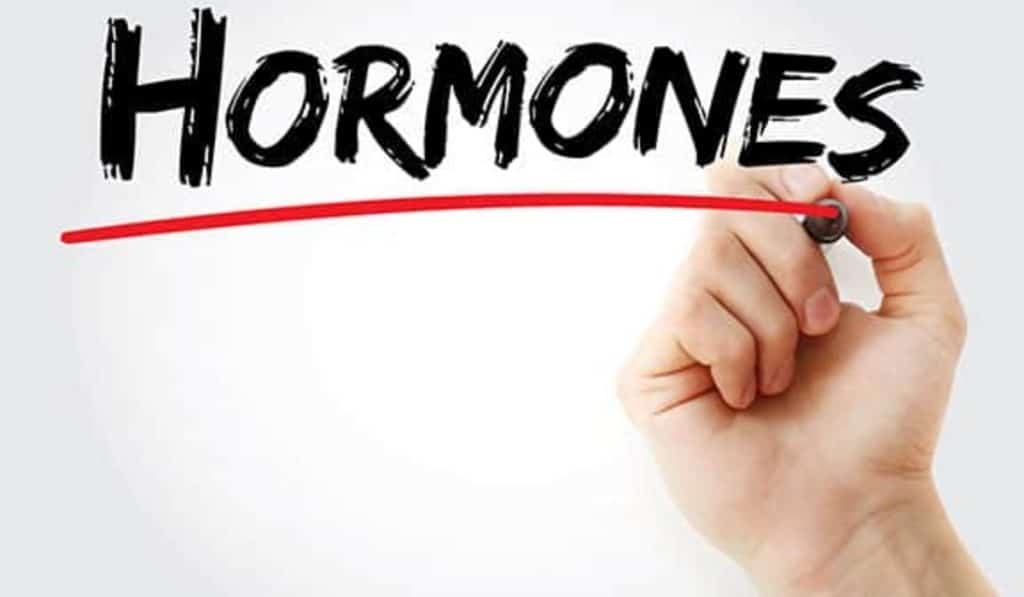
The function of hormones chemically is to regulate your body. Each gland is assigned to a job and it does it work automatically. It “pulls out” of the bloodstream all the ingredients it requires to manufacturer the appropriate hormone and then releases it back into the bloodstream for delivery to the “targeted area”.
In fact, the job of hormones is to regulate your body’s activities and its chemistry: hence the “messenger role”. It is important to remember all hormones work in unison and has interaction. Nothing in your body works in isolation. Hormones connect to every cell in your body, all day and all night long.
The major glands that make up the human endocrine system are the pituitary, hypothalamus, thyroid, parathyroid, pancreas, adrenals, and the ones of lesser importance include the pineal body, and the reproductive glands (gonads), which include the ovaries and testes. There are in the digestive system.
Causes of Hormonal Imbalance
Primary causes of hormone imbalance for both men and women are environmental toxins and diet, however, stress, neurotransmitters, candida overgrowth and adrenal fatigue are common contributors as well.
1. Environmental Toxins
A primary cause of Hormonal Imbalance to both men and women is environmental toxins. Every day we face the common causes, wherever we go or what food we eat, chemicals are found. (our food, homes, workplace, air, and water, personal care products, plastics, pesticides, herbicides, household cleaning products, cosmetics, etc).
This contains toxins called hormone disruptors (endocrine disruptors) – hormone disruptors disrupt, alters, and impede the normal function of our hormones.
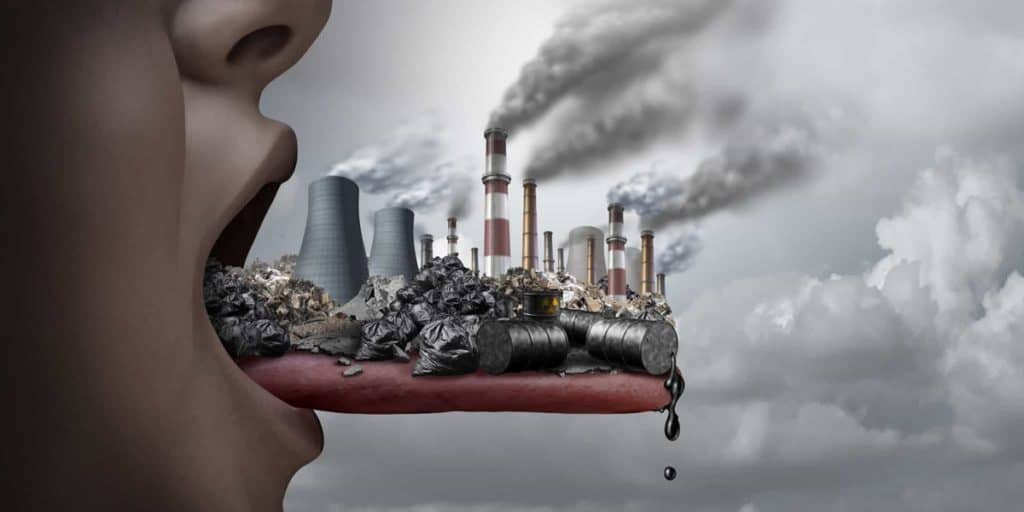
Xenoestrogens are a subclass hormone disruptor, mimic the natural estrogens in the body / prevent hormones from performing their job. It alters the way our hormones are generated, discharged, and metabolized. This can be found in pesticides, herbicides, fungicides, plastic, and more.
Accordingly, when this occurs, a variety of abnormal reactions occur in the body and result in symptoms such as those found in hormone imbalance as well as other detrimental impacts to the entire endocrine system, nervous system, immune system, reproductive system and metabolic system.
Once endocrine disruptors enter the body, they are very difficult to excrete, because the body is incapable of breaking them down. Birth control pills are another contributor as they make their way into our water supply and contaminate the soil our food is grown in. We are all exposed to a vast number of hormone disruptors on a daily basis.
2. Diet
Second biggest hormone imbalance is a diet that is high in white flour, refined carbohydrates, sugar, and caffeine and lacking in nutritional value it alters and destroys the endocrine system and metabolic functioning. Hormones require proper nutrition to function properly and produce hormones in adequate amounts.
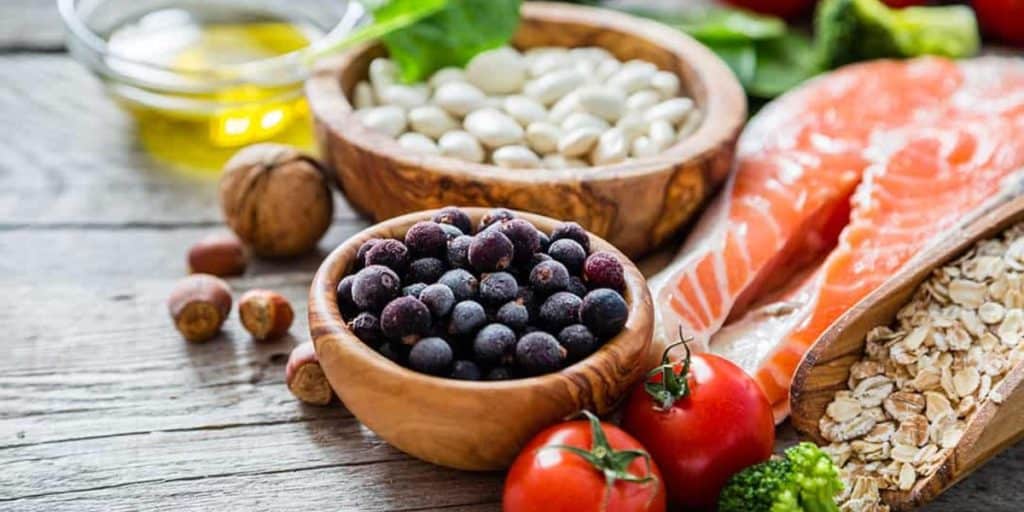
Unless you’re eating organic, then your food is contaminated with toxic pesticides, which we established in the previous section are hormone disruptors.
The meat supply and all meat byproducts like milk, cheese, yogurt, cottage cheese etc., are contaminated with hormones because the meat supply is pumped with hormones to make the animals grow bigger. When these foods are eaten, these hormones disrupt the natural hormones in the body.
3. Neurotransmitters
Neurotransmitters are the chemical messengers used in the communication system of the brain and body. They are involved in regulating basically all systems in the body in one way or another and play a crucial role in hormone balance.
Neurotransmitter deficiencies or imbalances are extremely common in the population today because of environmental toxins, sugar, caffeine, white flour, nicotine, alcohol, and lack of protein in the diet.
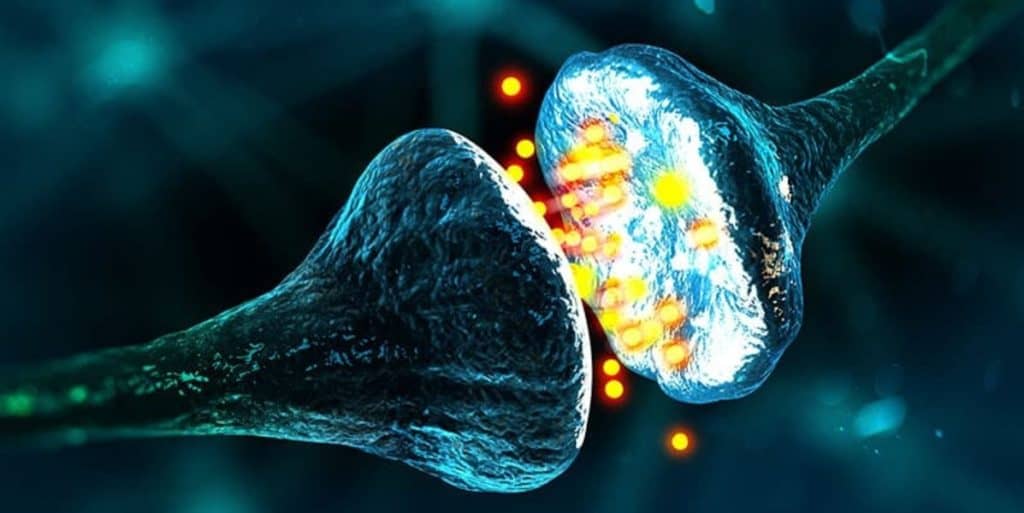
When this occurs, it results in numerous psychological and physiological symptoms we find in society today.
Also, when an imbalance or deficiency of neurotransmitters occurs, the body is not capable of producing and maintaining hormones in the body, as it should. This can result in creating a hormone imbalance or exacerbating an already existing hormone imbalance.
4. Too Much Stress
High levels of ongoing stress put too much demand on the endocrine system and deplete neurotransmitters, which as we already learned are highly involved in the regulation of hormones. When the endocrine system and neurotransmitters are not functioning adequately, hormones are not produced or regulated adequately.

Additionally, when there is a lot of stress there is a high demand for cortisol. If there is a high demand for cortisol, all the precursors that are needed to make hormones are used up making cortisol and nothing is left over to make hormones, this is called cortisol steal.
5. Adrenal Fatigue
Hormones have a significant impact on adrenal function and vice versa. Hormone imbalances can contribute to adrenal fatigue and adrenal fatigue can contribute to hormone imbalances. Each one has a reciprocal effect on the other. This is especially important as we age and the sex hormones are more dependent on the adrenal glands.
6.Candida Overgrowth
An overgrowth of Candida yeast is another common contributor to hormone imbalance. Candida Albicans eats progesterone, therefore resulting in excessive levels of estrogen in the body. Additionally, it alters and disrupts neurotransmitters and other hormones, thus altering the function of the central nervous system, thyroid, and adrenal glands.
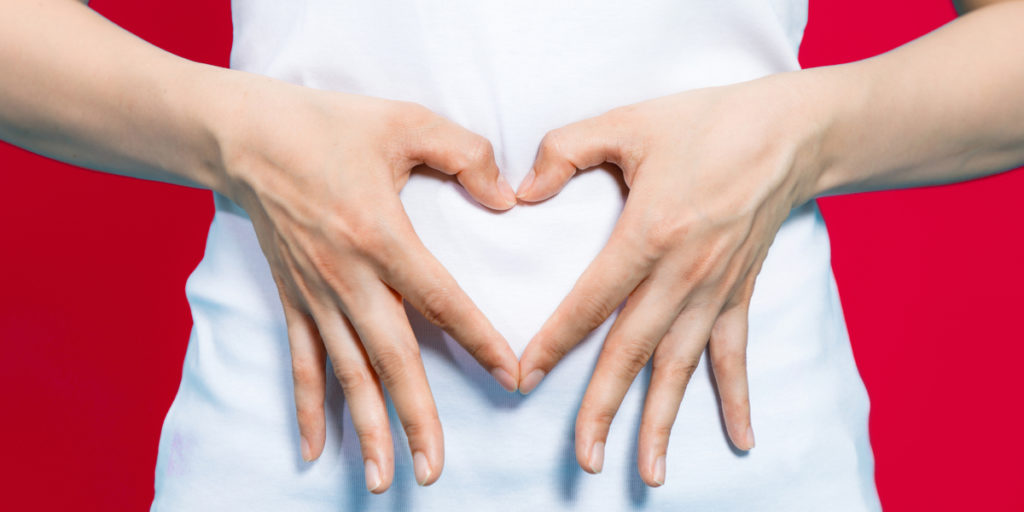
Furthermore, other causes of hormone imbalance may include aging, birth control pills, nutritional deficiencies, heavy metal toxicity, thyroid problems, physical trauma to the testes, tumors of the testes or pituitary, lack of adequate levels of GnRH, chemotherapy or radiation therapy, impaired glucuronidation or methylation, and problems in other areas of the endocrine system such as the pituitary and hypothalamus.
Female Hormonal Imbalances Symptoms:
Everyone experiences periods of hormonal imbalance at certain points in their life, but these can also occur when the endocrine glands (all glands in the body that make hormones) are not functioning properly.
The symptoms of a hormonal imbalance depend on which glands and hormones are affected.
Symptoms of hormonal imbalance include:
- unexplained weight gain or weight loss
- unexplained or excessive sweating
- difficulty in sleeping
- changes in sensitivity to cold and heat
- very dry skin/ skin rashes
- changes in blood pressure
- changes heart rate
- brittle/weak bones
- changes in blood sugar concentration
- irritability and anxiety
- unexplained long-term fatigue
- depression
- headaches
- needing to go to the bathroom more or less than usual
- bloating
- changes in appetite
- reduced sex drive
- thinning & brittle hair
- infertility
- blurred vision
- breast tenderness
PCOS and Hormones
Polycystic Ovary Syndrome (PCOS) is an imbalance of female sex hormones. The ovaries are part of the female reproductive system along with the fallopian tubes, uterus, and vagina. Your ovaries contain the lifetime supply of eggs.
Moreover, PCOS affects a woman’s ovaries, the reproductive organs that produce estrogen and progesterone — hormones that regulate the menstrual cycle. The ovaries also produce a small number of male hormones called androgens. PCOS raises risk for:
- Type 2 diabetes because of excess insulin resistant
- Heart disease
- High blood pressure
- Cholesterol abnormalities
- Endometrial cancer
Overweight and Hormones connection
The most common hormonally-based reasons why women cannot lose weight are due to:
- Low thyroid function
- High cortisol levels
- High estrogen
- Low estrogen
- Insulin resistance
Estrogen and its functions
Estrogens are a group of hormones that play an important role in the normal sexual and reproductive development in women. They are also sex hormones. The woman’s ovaries make most estrogen hormones, although the adrenal glands and fat cells also make small amounts of the hormones.
In addition to regulating the menstrual cycle, estrogen affects the reproductive tract, the urinary tract, the heart and blood vessels, bones, breasts, skin, hair, mucous membranes, pelvic muscles, and the brain. Secondary sexual characteristics, such as pubic and armpit hair, also start to grow when estrogen levels rise.
Symptoms of Insufficient Estrogen:
- Brain fog, Depressed state,
- Vaginal dryness and irritation *one of the primary symptoms of not enough estrogen,
- Incontinence, Irregular menstrual cycle,
- Headaches, Hot flashes, Bone loss,
- Memory problems, Disrupted sleep,
- Frequent vaginitis and/or vaginal infections,
- Joint pain, stiffness, and swelling
- Heart palpitations, Hot flashes, Rapid pulse,
- Night sweats, Recurring bladder infections,
- Excessive perspiration,
- Low self-esteem or sense of well-being,
- Loss of breast fullness, and Intolerance to exercise.
Progesterone and its functions
Is an essential function of the female reproductive system; produced in the ovaries during the second half of the menstrual cycle, and also by the placenta during pregnancy; production declines during the menopause. Helps prepare the endometrium for implantation of the fertilized ovum and mammary glands for milk secretion. Progesterone is important during childbearing years. If you don’t have enough progesterone, you may have trouble getting or staying pregnant.
Signs of low progesterone can include:
- Spotting before your period
- Very heavy menstrual flow
- Premenstrual syndrome, especially poor sleep and anxiety
- Difficulty getting pregnant
- Early miscarriage (before 7 weeks)
- Perimenopause symptoms such as mood swings, difficulty sleeping, heavy periods & irregular cycles
- Weight gain
- Gallbladder problems
Symptoms of Insufficient Estrogen and Progesterone
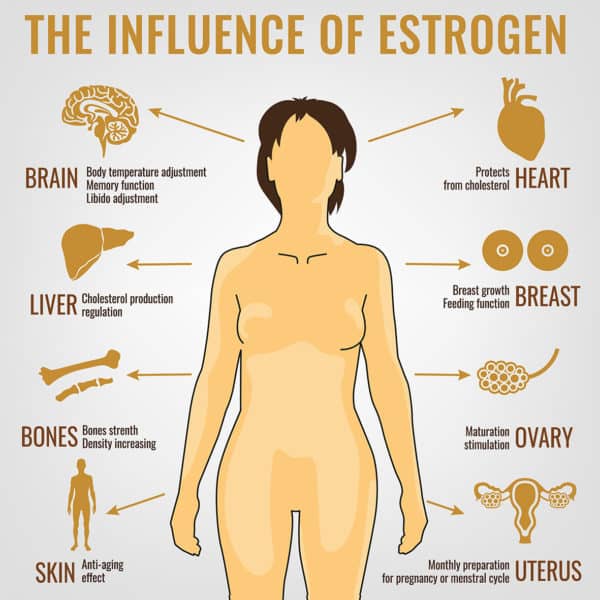
Estrogen Dominance: (a symptom of too much estrogen, not enough progesterone) is the most common imbalance found in women today, because of environmental toxins and diet that alter and disrupt estrogen.
- Tender/Breast Swelling
- Heavy/ Irregular menstrual flow, PMS
- Fibrocystic breasts
- Rapid and erratic mood swings
- Irritability
- Cyclical headaches or a migraine
- Cysts on the Ovaries
- Extra weight in the abdominal area,
- Anxiety, Dizziness, Insomnia or disrupted sleep,
- Low libido, Difficulty in concentration
- Muscle Cramps
- Uterine fibroids
- Short-term memory loss, Sugar cravings,
- Hypoglycemia, Gallbladder problems,
- Infertility, Acne,
- Extreme inability to cope
However, it’s important to keep in mind that it is possible to have not enough estrogen and still be estrogen dominant if you have low levels of estrogen, but even lower levels of progesterone.
How hormones affect us
We like to think we are in charge of our own behavior — that our thoughts are under our conscious control and that our actions are mostly reasonable. But our behavior is also in the way of an ancient system of mind control: hormones.

These protein messengers are best known for their fundamental duty as regulators — think of insulin and blood sugar, for example — but they also bathe the brain in chemical information that tells us about the world around us and the people in it.
HORMONES THAT CAN AFFECT YOU
Adrenocorticotropic. Secreted by the Pituitary gland. It stimulates adrenal cortex to secrete other hormones.
Aldosterone. Secreted by Adrenal Cortex. Increases re-absorption of sodium from urine and stimulates excretion of potassium.
Androgen. A group of hormones that contribute to the development of the male reproductive system.
Antidiuretic Hormone / ADH/ Vasopressin. Secreted by Hypothalamus. Affects urine volume, stored in the posterior pituitary.
Calcitonin / CT. Secreted by Thyroid. Homeostasis of blood calcium and phosphate levels.
Cholecystokinin. Secreted by Duodenum. Inhibits secretion of gastric juice, decreases movement of GI tract, stimulates secretion of pancreatic juice rich in digestive enzymes, causes ejection of bile from gallbladder and opening of sphincters at common duct, and induces a feeling of satiety; may regulate feeding as a “stop eating” signal.
Corticosterone. Secreted by Adrenal Cortex. Converted to aldosterone by aldosterone synthase.
Corticotropin-Releasing Hormone. Secreted by Hypothalamus. Stimulates release of ACTH involved in the regulation of food intake, energy homeostasis, and stress response.
Cortisone/Cortisol. Secreted by Adrenal Cortex. It helps control blood sugar levels, regulate metabolism, help reduce inflammation, and assist with memory formulation. It has a controlling effect on salt and water balance and helps control blood pressure.
Epinephrine/Adrenaline. Secreted by Adrenal Medulla. Helps body resist stress by increasing heart rate, constricting blood vessels, accelerating respiration, decreasing digestion, increasing efficiency of muscular contractions, increasing blood sugar, stimulating cellular metabolism.
Follicle-Stimulating Hormone. Secreted by Pituitary. Stimulates production of eggs and sperm.
Glucocorticoids. Secreted by Adrenal Cortex. Resistance to stress. 3 of them: cortisol, corticosterone, and cortisone. Makes, sure enough, energy is available; conversion of non-carbohydrates into energy; makes blood vessels more sensitive to vessel-constricting chemicals, anti-inflammatory.
Growth Hormone Inhibiting Hormone. Secreted by Hypothalamus Pancreas, Intestinal Tract, Central of Nervous System, Outside of Hypothalamus. Inhibits secretion of acid and pepsin and release of gastrin, insulin, and glucagons; inhibits the motility of the gallbladder and intestine; suppresses secretion of lipase by the pancreas; slows the absorption of nutrients from the gastrointestinal tract.
Insulin. Secreted by Pancreas. Decreases blood sugar levels; prevents muscle from being broken down.
Luteinizing Hormone. Secreted by Pituitary. Stimulates sexual reproduction activities.
Melanocyte-stimulating Hormone. Secreted by Pituitary. Increases skin pigmentation. Inhibits fever and peripheral inflammation. Suppresses appetite.
Oestrogen. Secreted by Ovaries. Develops and maintains female reproductive structures, especially the endometrial lining of the uterus, and secondary sex characteristics, including the breasts. Contributes to fluid and electrolyte balance. Important for bone density in both women and men.
Oxytocin. Secreted by Hypothalamus. Contraction of a uterus and mammary glands, breastfeeding, orgasm, autonomic control of emotions. Stored in the posterior pituitary. Lowers steroid synthesis in testes.
Parathyroid Hormone. Secreted by Parathyroid. Helps to control homeostasis of calcium and phosphates in the blood.
Progesterone. Secreted by Ovaries. Essential for the function of the female reproductive system; produced in the ovaries during the second half of the menstrual cycle, and also by the placenta during pregnancy; production declines during the menopause. Helps prepare the endometrium for implantation of fertilized ovum and mammary glands for milk secretion.
Prolactin. Secreted by Pituitary. Initiates milk production by mammary glands. Excess prolactin can lead to an absence of ovulation, lack of periods, excessive or spontaneous secretion of milk in women, and decreased sex drive, decreased sperm production and impotence in men. Women who cannot conceive often have high levels of prolactin. Enhances dopamine secretion. May be involved in the immune system.
Relaxin. Secreted by Ovaries & Placenta. Relaxes pubis & dilates cervix towards the end of pregnancy.
Secretin. Secreted by Intestinal Mucosa. Inhibits secretion of gastric juices decreases movement of GI tract, stimulates secretion of pancreatic juice rich in sodium bicarbonate ions, and stimulates secretion of bile by hepatic cells of the liver.
Testosterone. Secreted by Testes in men, ovaries in women. Small amounts secreted by adrenal glands. Secreted primarily by the testicles of males and the ovaries of females, although small amounts are also secreted by the adrenal glands; plays a key role in the development of male reproductive tissues such as the testis and prostate as well as promoting secondary sexual characteristics such as increased muscle, bone mass, and the growth of body hair; also involved in the prevention of osteoporosis.
Thymosin. Secreted by Thymus. Maturation of T lymphocytes.
Thyroid-stimulating Hormone. Secreted by Pituitary. Stimulates the thyroid gland to produce its hormones
Thyrotropin Releasing Hormone. Secreted by Hypothalamus. Stimulates the anterior pituitary to secrete.
Triiodothyronine. Secreted by Thyroid. Regulates metabolism by stimulating carbohydrate and fat breakdown, growth and development, and regulate the activity of nervous system resulting in an increased and more forceful heartbeat, increased motility of GI tract, increased nervousness.
Human Growth Hormone. Secreted by Anterior Pituitary. Increases the growth rate of the skeleton and skeletal muscles in children and teenagers. In adults helps to maintain muscle and bone mass and promote healing of injuries and tissue repair; speeds up the breakdown of liver glycogen into glucose; excess production may cause diabetes mellitus.
How We Can Help You
Natural Hormonal Imbalance Cure
The earth is filled with many, many toxins. The chemicals that we inhale, ingest, or have contact with tend to alter our hormones.
When the switches to the hormones are not functioning, various physical and mental conditions can be affected. Daily headaches, difficulty walking, brain fog, chronic fatigue, nervousness, low libido, weight gain, acne and behavioral disorders in children are some of the concerns.

When hormones are not processing correctly, our natural and non-medical techniques can be used to help switch the proper hormones back on. When activated, there will be a reduction in the symptoms of headaches, difficulty walking, diabetes, and so on.
The technique uses chiropractic and acupressure to desensitize the body to the blocked pathways with that particular hormone. Then the body starts to heal itself by going through a natural detox.
CONCLUSION
In short, hormones cannot be supplemented externally. However given the right nutrient, trace elements, and vitamins, the body begins to correct the hormonal imbalance from within through our wellness sessions.
Visit: www.naetdubai.com. You will find a wealth of information here along with an opportunity to speak confidentially on any of these numbers 04-420 1633 or WhatsApp or Call 056-639 0197 us.




One Response
I love reading your site.